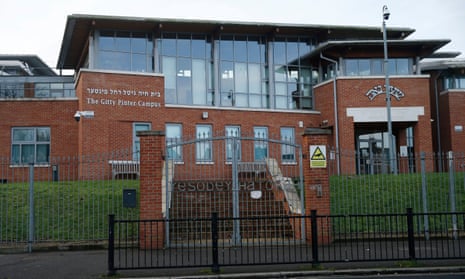England’s lockdown rules are being flouted in ultra-Orthodox Jewish areas, with large weddings taking place each week and schools continuing to operate, according to community insiders and local residents.
Last week police discovered 150 guests celebrating a wedding at the Yesodey Hatorah girls’ school in Stamford Hill, north London. The school denied knowledge of the event, which was condemned by the chief rabbi and the Union of Orthodox Hebrew Congregations.
On the same evening, police attended a hall in Belz Terrace, a few minutes’ walk from the school, following reports that a large wedding was taking place there. However, officers were satisfied that the event was a communal service, which is permitted, rather than a wedding and no action was taken. According to a community insider, the wedding was being held in a basement of the hall which the police did not enter.
The chief rabbi and the Board of Deputies of British Jews, whose authority is not recognised by ultra-Orthodox, or Haredi, Jews, swiftly condemned the Yesodey Hatorah wedding. Most British Jews are following lockdown rules.
There have been a disproportionate number of deaths among ultra-Orthodox Jews during the pandemic. Among contributory factors are large intergenerational households and difficulties in transmitting public health messages to communities that rarely engage with the internet or mainstream media.
“Many people are trying to do the right thing, but compliance on the ground remains an ongoing challenge, largely due to the communication barriers,” said Polly Cziok, who liaises with the community on behalf of Hackney council. She said the pandemic had strengthened the council’s partnerships with the community.
Some Haredi rabbis and leaders have tried to persuade communities to abide by the lockdown rules and have been dismayed by breaches. But according to a man who worked in the Haredi wedding industry in north London until last spring, large weddings have been taking place in at least five halls most weeks. “They start at about 5pm and run through until 3am or 4am,” he said.
Several contractors had caught Covid after working at such weddings, including one where the bride and her mother both tested positive for the virus before the ceremony, he said.
“A number of my former colleagues have reported these weddings to the police but they have turned a blind eye. What’s going on is morally, ethically and even religiously wrong.”
A freelance photographer who was hired to take pictures at around a dozen Haredi weddings in school and synagogue halls last summer and autumn said she had declined further bookings after an event in Stamford Hill in October attended by 300 guests.
“I was utterly shocked that no one was wearing a mask except me, and they all looked at me like I’m mad,” said Marisa D’Alessandro. “I was told that weddings would be much smaller and quieter than usual, but the ones I have attended have been nowhere near the permitted numbers. There is no respect for the guidelines.”
An investigation by Jewish News has also uncovered accounts of multiple large weddings each week in Stamford Hill, with organisers demanding a £10,000 payment upfront in case they are fined by police.
Weddings were banned during the first lockdown last spring but were permitted over the summer with a maximum of 30 guests, later reduced to 15. Under the current lockdown rules in England, they may only take place in exceptional circumstances and with a maximum of six people in attendance.
Last weekend the Metropolitan police attended an Orthodox synagogue in Barnet, north London, and saw 80 to 100 people leaving the building. The number was “too high to be able to comply with social distancing guidance in the space available at the venue,” the Met said.
Following a second visit the same day, a 48-hour dispersal zone was ordered in the area around the Ohel Moshe synagogue from Saturday afternoon until Monday afternoon.
Many schools in ultra-Orthodox Jewish communities have continued to operate during lockdown. Under the rules, vulnerable children – including those with no or limited access to computers at home – are allowed to attend school. Ultra-Orthodox Jews traditionally shun the use of the internet, smartphones, television and mainstream media.
One Stamford Hill resident whose home overlooks an ultra-Orthodox school said it was “packed with kids, it’s business as usual. It doesn’t look like there’s any adherence to the rules.”
A teacher at a Haredi school in the Manchester area said: “Schools are running at 100% capacity. The guidelines are vague, and it’s up to the headteachers’ discretion. They’re saying they’re all children of key workers. I feel an enormous responsibility to my class, but I’m also anxious about my mental and physical health.”
Hackney’s mayor, Philip Glanville, the public health director, Sandra Husbands, and the local police commander Marcus Barnett issued a joint appeal this week urging the Haredi community to avoid large gatherings.
“Attending weddings, parties, or other events is a huge risk in a pandemic situation, both to you and the people you live with,” they said in a letter published in the Heimische newsletter, which goes to every Haredi home in Stamford Hill.
